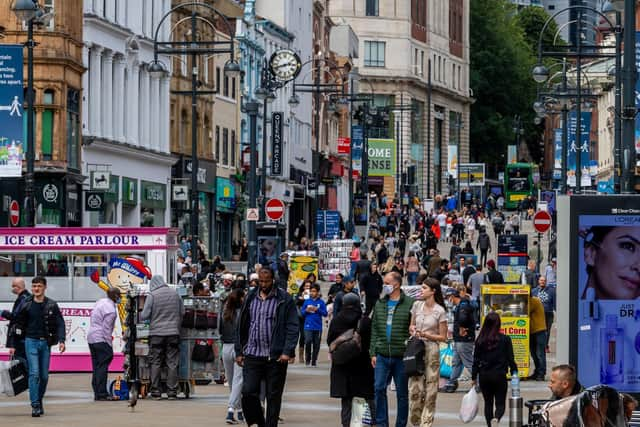West Yorkshire's economy 'would not recover from a second coronavirus lockdown until 2027'
West Yorkshire Combined Authority has drawn up plans for how it can speed up its recovery from the pandemic with investment in health tech, digital, entrepreneurs and the transition to a net-zero-carbon economy.
But its proposal to be submitted to Ministers includes a stark warning about the impact the lockdown is likely to have on the economy of West Yorkshire and its 2.3 million population.
Advertisement
Hide AdAdvertisement
Hide AdGlobal information services company Experian estimates that that if West Yorkshire's economy returns to pre-crisis levels by the end of the September, it would have contracted by 10 per cent or £5.3bn over the course of 2020.
But in the worst case scenario of a double-dip recession and a second lockdown this winter, more than £12bn would be wiped off the county's gross value added (GVA) representing the value of its economy in the same period.
In this scenario, average unemployment rates locally would peak at 10 per cent and levels of joblessness would not return to pre-crisis levels until 2027 at the earliest.
While the best-case scenario would see 30,000 jobs potentially lost in 2020, a second lockdown could result in 58,000 jobs going over the year.


Advertisement
Hide AdAdvertisement
Hide AdThis weekend, Prime Minister Boris Johnson said he does not want to impose a second national lockdown in the event of another Covid-19 outbreak.
The PM compared the option of a nationwide shutdown to a "nuclear deterrent", adding he does not think the country "will be in that position again".
But the UK's chief scientific adviser said there is "a risk" such measures could be needed as winter approaches.
West Yorkshire Combined Authority's draft economic recovery plan, to be discussed by leaders next week, sets out how the county can make a contribution to the national recovery and deliver the Government’s leveling-up agenda.
Advertisement
Hide AdAdvertisement
Hide AdIn total the authority is asking for investment worth £1.1bn, including £108m for a digital infrastructure fund to pay for projects including the expansion of superfast broadband.
Other 'asks' include £38m to deliver an 'entrepreneurial revolution', supporting a doubling of annual start-up businesses to 20,000, and £35m for a scheme to boost research and development.
There is an emphasis on moving to a net-carbon-zero economy, with a request for £192m to build on West Yorkshire's strengths in clean growth as well as tackling the climate emergency.
Susan Hinchcliffe, Chair of the West Yorkshire Combined Authority and Leader of Bradford Council, said: “The Combined Authority and its partners are focused on doing all they can to support our region in the recovery from the devastating impact of COVID-19.
Advertisement
Hide AdAdvertisement
Hide Ad"These draft plans are about creating a better, more equal economy for the future and a cleaner, sustainable environment, with better jobs, higher skills and the right infrastructure for our communities.
“This work has been led by local leaders, because the recovery efforts must be led locally if they are to be successful - focused on our local needs and led by those who know the West Yorkshire people and its economy.”
The report says that while West Yorkshire's economy is one of the most diverse in the UK, making it more resilient, its productivity levels are 14 per cent below the national average.
Around 517,000, one in five of the population, live in areas defined as being amongst the most deprived 10 per cent in England, with relative levels of deprivation getting worse between 2015 and 2019.
Advertisement
Hide AdAdvertisement
Hide AdIt says: "The impacts of the COVID-19 global pandemic have affected everyone in the region. It is a health crisis that is producing a further economic crisis across the UK, but that could last longer in some parts than others.
"It is a pandemic that also underlines inequalities in our national economy, that is having a disproportionate impact on our most disadvantaged communities and strengthens the call for desperately needed levelling-up of the North."
Comment Guidelines
National World encourages reader discussion on our stories. User feedback, insights and back-and-forth exchanges add a rich layer of context to reporting. Please review our Community Guidelines before commenting.